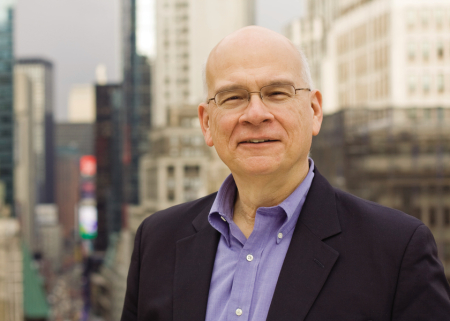Tim Keller reflects on 'design deficits' in megachurches: 'Poor places for formation and pastoral care'

Megachurches are often “poor places for formation and pastoral care,” according to Tim Keller, who reflected on some of the “design deficits” of these churches and what he called "a deadly problem" as Christians are being "more formed by social media than local Christian community."
In a lengthy Facebook post, the 71-year-old pastor shared his thoughts on megachurches to explain why the New York City-based church he founded, Redeemer Presbyterian Church, decided to split into three congregations following his retirement.
“Megachurches have some design deficits,” said Keller. “In general, they are poor places for formation and pastoral care due to their size. In our current cultural moment that is a deadly problem because Christians are being more formed by social media than local Christian community. We need thick communities and the size of our churches factor into that.”
The pastor said that because megachurches are grown large under a founder, “they are not usually sustained by being given to one successor.” A megachurch by definition has a weekend average worship attendance of 2,000 and more.
“That person is always excessively and sometimes harshly compared in every way to the founder. It’s lose-lose for them and the movement,” he wrote, adding that megachurches “usually depend too much on the gifts and personality of that founder so the sooner that addictive dependence is broken, the better.”
The pastor posited that oftentimes, megachurch founders come to see the church “as their personal possession and an extension of their personality and self-image, they often never want to leave, nor do they know how to well. It is good to leave sooner rather than later as a spiritual discipline.”
Keller planted Redeemer in Manhattan in 1989 with about 50 attendees. When the bestselling author retired in 2017, the church had a weekly attendance of over 5,000, according to The Gospel Coalition.
At that time, the congregation expanded into three locations with three different pastors. Since then, the church has added two more congregations.
“I was able to hand off Redeemer to a more diverse group of leaders — instead of one white American, Redeemer has now been led by senior pastors who were Chinese, Korean, British, and Nagamese/Lebanese. All, though solidly united on Reformed theology, bring their distinct, enriching cultural perspectives, experiences and wisdom,” Keller wrote.
Smaller congregations, he said, “must make use of a greater percentage of lay persons’ gifts and talents. There is less dependence on staff and a smaller number of onlookers who only attend to observe and not participate.”
Redeemer, he said, was never intended to be one megachurch, but rather had the goal of building “a great city for all people through a movement of the Gospel.”
“Gospel movements are fueled by the multiplication of generative churches, and diverse leaders,” he wrote.
Keller also noted that megachurches draw people from great distances who are unable to participate in the life of the church.
“It is harder for them to be other-focused in the local area,” he stressed. “Cities and regions can benefit from the unique resources of a megachurch (eg counseling centers, seminaries). But in general, the area — and the Christians — will benefit more from 10 churches of 400 scattered throughout the city, rather than one church of 4,000 in the middle of it.”
Megachurches and their structure has been the topic of much debate in recent years, particularly as churches grapple with the phenomenon of Christian celebrity pastors publicly failing.
In an op-ed for The Christian Post, Darvin Wallis, pastor of Mission Church in Denver, Colorado, pointed out that the Evangelical church has embraced corporate leadership paradigms for the last three decades.
“This has worked wonders for the bottom lines of attendance, giving, and the number of reported conversions,” he wrote. “Yet, it has also created a crisis in leadership. As the church continues to identify and form leaders to fit into the corporate executive mold, we have seen an epidemic of those leaders going through the same types of scandals we see in corporations.”
Scott Sauls, pastor of Christ Presbyterian Church in Nashville, Tennessee, told CP that therefore, pastors — particularly those of successful, growing churches — must routinely examine their hearts and ask themselves: Are we stewarding these resources for good? Or are we distorting them? Are we in this for our own glory, fame, reputation and honor? Or are we in this for Jesus’ glory and fame and reputation?
“Are we stewarding the things that have been entrusted to us for the glory of God and for the benefit of our neighbor and the flourishing of the priorities that God has put forth in His Word? Or are we using those things to serve ourselves, whether it's to boost our own egos and platforms or line our own pockets?” Sauls asked.
Sauls assured that there’s nothing wrong with running a well-led organization that prioritizes excellence and wants to flourish financially. “But it all depends on why you want to flourish.”
“Do you want to flourish financially in order to have long pockets and in order to be powerful and have control? Or is it because you want to have a greater capacity to serve your community and bless your neighbors and meet the needs of the neediest among you and the hurting?”
Leah M. Klett is a reporter for The Christian Post. She can be reached at: [email protected]





















